#evil with a colon three
Explore tagged Tumblr posts
Text
I feel like Lesbian Anon should call me Mr No Cooties as I am aroace and as such cooties are not something I could have
1 note
·
View note
Text

This was a few hours ago. C and I have been too busy taking care of Mort3 after all of this to post an update.
We found them. We found them and we're never losing them again.
#emorty.img#rick and morty#morty smith#evil morty#morty c137#colon three morty#kitty morty#mort3#rp blog
21 notes
·
View notes
Note
alright. uh. me and @emorty are on our way.
- @msc137
AHH IM SO EXCITED!! I HAVE AN OUTFIT ONA ND EVERYHTIN SND I HAVE GIFTS AND!
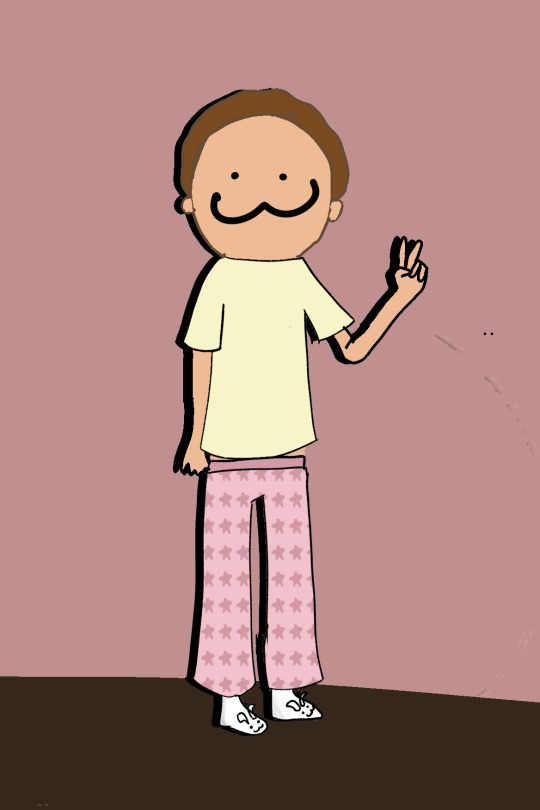
#kitty morty#ask blog#rick and morty#morty c137#morty smith#pemorty#rp blog#evil morty#Colonthreemorty#colon three morty
18 notes
·
View notes
Text
oh my god. oh my god?? holy shit. holy fucking shit oh my fucking god they made me a yellow portal gun!!! @emorty and @colonthreemorty made me a portal gun that can go outside the curve!!! i can go anywhere now!! all on my own!!!
and theres- oh my fucking god thats so fucking sweet theres an "E + M" engraved in a heart on the handle!!!
oh my god. oh my god.
thank you, both of you, so much. i hardly even feel like i deserve it, you guys both figured out how to break the curve on your own, and i just get it handed to me? i dont know what to say. thank you. thank you thank you thank you.
13 notes
·
View notes
Text
Effie and Skittle attempt to enjoy their night together before Primess's calls in her favour. Pity Primess is quite sadistic.
Feat Colon three, Skittle, Effie and Primess. With some minor appearances by Chance and BirdMorty
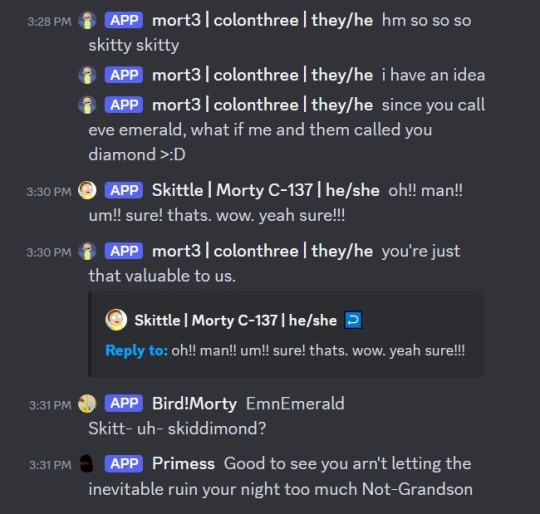




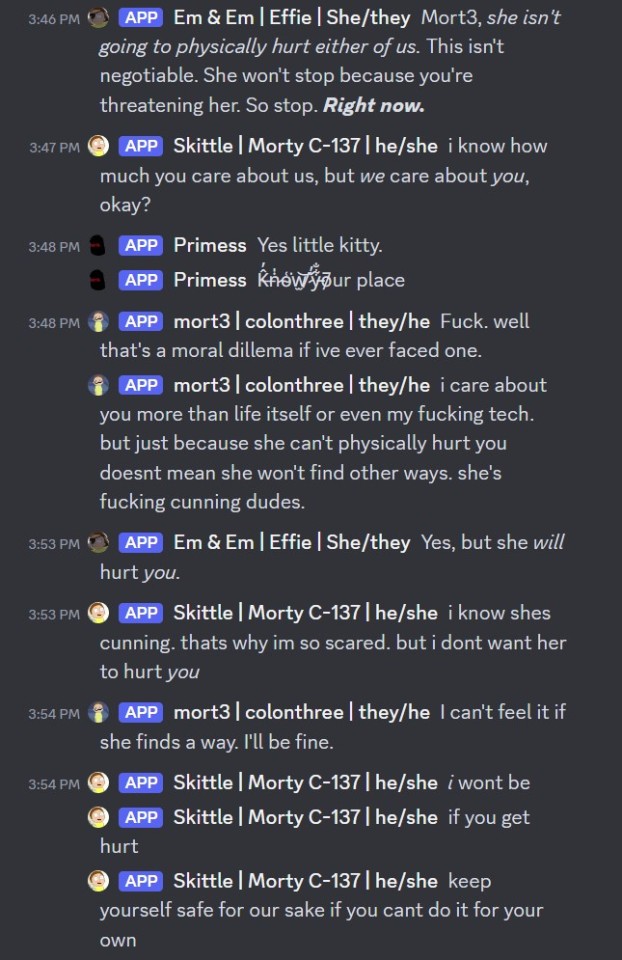

#rick and morty#group chat#canon post#colon three morty#morty c137#evil morty#primess#rp blog#ntc official
8 notes
·
View notes
Text
The Owl House’s first episode really is a litmus test for people who claim to support Problem Kids who act out but ultimately need support by their community instead of punishment by the system, because jeezus.
The way so many people were clutching their pearls over Luz bringing fireworks to school, treating her like some domestic terrorist in the making who needed to be carted away, and not just… An eager kid who got in over her head trying to bring fun with something associated with fun, especially in her country!!! Like this was so obviously a well-meaning child who just needed to be sat down and explained the dangers of fireworks, who was clearly willing to listen!
And yeah, Luz DID become a domestic terrorist. But you know what I mean, and really that just proves my point that Luz can be a rebel in a fantastical sense, but when you apply it to a real-world context, suddenly she’s a menace that needs to be stopped. Because it’s easy to root for the metaphor until you have to uncomfortably apply it your own life. Why else would Belos be an actual colonizer from IRL history, and not just a space alien or demon?
It’s the way people saw this cartoonishly-evil system that the show was so unambiguous about, and because they thought they were being clever by being uncritically contrarian (when really they were just affirming their own latent biases), they argued that Oh yeah maybe the system IS good for Luz, maybe this is what she needs! The way people were so ready to take the camp’s promises at face value, that See it’s going to teach her how to do taxes and listen to the news!
People were just so insistent that actually, the Troubled Teen Industry means well and will do well in taking this brown child away from her struggling brown mother, without a choice for either of them. They just ignored the obvious bit about Principal Hal sending Luz to the camp as a punishment, out of spite, after breaking his promise to give her another chance as soon as he ran into the aftereffect of Luz’s prior chance. Luz even brings it up, “That doesn’t count, right?” And he still went through with it because he doesn’t actually care about what Luz needs, he just wants to punish her!!!
It’s Be Gay, Do Crimes until the protagonist performs actual crimes and suddenly she has to be arrested. Nobody questioned how at least half the incidents Luz was sent to the office over were clear overreactions by the school; Things that didn’t harm anyone! It’s almost as if, gee, maybe sometimes kids DO cause problems, but there’s a particular bias and double-standard regarding certain demographics, and so they’ll be punished for the same things other well-behaved kids get away with! Principal Hal clearly had it out for Luz from the start , so I really don’t care about his judgment.
It’s all about restorative justice for criminals, until one of them does something even remotely problematic and suddenly they have to be hauled off and not worked with. It’s all about supporting child welfare, recognizing that kids are a struggling and oppressed class in and of themselves, until Luz is having her entire summer vacation, a whole three-months period to herself that is idolized in our culture by kids for this reason, to be sent learning how to do taxes.
But nnoooo these are important life skills, you argue! But if your parents used up your whole vacation, your only reprieve, to send you to a camp where you had to learn these things, you would understandably be calling it child abuse. Y’all stress the importance of breaks and how school genuinely wears a kid down, and vacation is legitimately necessary; But Luz is a Problem Child and you’ll say it with unironic contempt.
And that’s not even getting into the implicit bigotry of the system, because under kids’ show censorship you can’t actually SAY that the system is targeting Luz disproportionately for being brown. But you can definitely imply it, just as in Teen Titans, Cyborg goes on a whole spiel about how he can verbalize Starfire’s struggles with fantasy bigotry without her even having to explain it to him, clarifying that he knows because he’s… part-robot.
Belos isn’t allowed to rant about indigenous peoples but his attempted genocide of natives in a fantasy world is so obviously meant to hearken to what IRL Puritans did with Native Americans, and the show even clarifies that its universe’s witch hunters had the same motives as IRL witch hunters, who were racist, misogynistic, etc. Lilith tells Luz to go back to her world. The Reality Check Camp has Masha, an obvious Russian migrant child, a dark-skinned kid, and another kid based off of Molly Knox Ostertag, who is openly queer. Gee, it’s almost as if the camp is targeting, specifically, kids who don’t fit within the cultural hegemony of the United States!
And yes, it’s interesting that Yesterday’s Lie creates ambiguity for Luz because these kids seemed to get along and find each other because of the camp… From her own perspective. But Luz doesn’t have the luxury of re-watching a scene carefully, she had other things on her mind. She’s canonically an Unreliable Narrator who remembers things as worse than they actually were, as revealed in the very next episode.
The kids said they found solidarity while also calling the camp terrible, so it’s clear it was an unintended side-effect of the camp, it had nothing to do with the camp itself; But Luz isn’t the calm, detached viewer. So her takeaway is something that will fuel her regret over coming to the isles, which her mother really contributes towards at the end of said episode.
I don’t think TOH is the pinnacle of Leftist media, obviously. It’s basic, entry-level stuff; But this is a kids show. So not only is its effort impressive for a kids show and setting the bar, but it’s also a good introduction for kids into other ideas. The writers are clearly operating off of ideas and beliefs, so it’s fun analyzing how they bleed into their work, how they think to convey these ideas, and Readings are always a thing. And also, yeah; It IS a kids show! What I’ve said should be obvious to kids, the first episode is cartoonishly obvious, but some of y’all are actual grown adults who still can’t get it, how embarrassing!
And in the end, I don’t think it’s because you don’t have the skills. I think some of y’all do understand, but are just contrarians who live in a perfect bubble where you don’t notice the system’s issues and are insistent on taking its side, even when the narrative is unambiguous about its fault. I also think some of y’all are just racist, and/or misogynistic. That some of the people saying this are white does not elude me.
I know I toss those words around a lot, but seriously; It genuinely is everywhere, but of course privileged people can ignore it, and treat women and PoC as insane and overreacting. It’s Not That Deep until it bleeds into everything, including people’s writing and how they engage with media. Luz was struggling with the viewers’ own racism since the first episode.
The most absurd part is that the show does get around to this; It does address that Luz can get carried away, and that she needs to be more mindful. It can also be nuanced in acknowledging that she was disproportionately targeted and punished for being “weird.” The first episode sets up the show’s conflict, its themes, its status quo and cast; As well as the flaws and trajectory of our main character’s arc. It begins addressing these things pretty early on with Luz learning to be more mindful as early as the fourth episode.
But y’all are adults who lack reading comprehension with a kids show, and demand every issue of the protagonist be resolved in its first episode, which is already going fast because of everything else it’s handling, on top of its first lesson for our protagonist. Y’all really needed Luz’s flaws to be resolved ASAP instead of her development occurring naturally over the course of the show, and ending with the show because it’s about her story.
Because you can’t bear to deal with a girl of color’s flaws being a consistent thing on the backburner spaced across the show for her to eventually conquer, she needs to be punished immediately! Because it’s not enough that she learns and grows from her mistakes, no Luz needs to also be punished in a show that starts off talking about the system’s disproportionate punishment. But then y’all see your white faves and complain about how they were so much more fun when they were mean, why didn’t they stay mean, why didn’t we get more time for them to be mean before they had character development…!
224 notes
·
View notes
Note
wings of fire is some of the best "adult" fantasy out there and im tired of pretending it isnt.
ive read the first three wheel of time books (pretty much lord of the rings 2, its massive and much grander in scale) and i keep thinking about wings of fire and how it does everything robert jordan did but better. besides maybe some more mature themes of gender and duality, although those are the biggest themes in wheel of time.
even in other series, many worlds that have a very blatant "anti racism" message portray it really bad, even if it is out of goodness. in the stormlight archive by brandon sanderson, the singers (named parshmen) are a slave class of human/crab like beings. the ones that are slaves are known for having their ability for higher thinking stripped from them, and start a revolution with the bad guy once they get their minds back.
unlike wings of fire, these series simply make the generic stand in for the opresed race monsters. human like monsters, but still god damn monsters. it makes sense why a human would think a singer parshmen is subhuman, they are.
but wings of fire? it does it so beautifully. rainwings are considered lazy, but they just have different sleep schedules. silkwings are second class citizens because its the only way for them to achieve peace without violent revolution. nightwings are colonizers because its the only way they can survive.
some are evil, and others not. but they arent monsters. a rainwing is as much a dragon as a nightwing is. it doesnt matter how sub-dragon they appear, they arent. and it makes sense why they are seen as such, its so beautifully written.
sure, wof has its flaws. animus magic is quite iffy, and arc 3 was rushed. but it is a fantasy master piece up there with lord of the rings, the cosmere, wheel of time. and im tired of people brushing it aside because its a kids series (it still is) and "oh yeah my kids love that" or "i wasnt a fan of the juvenile aspects" as if it isnt a god damn kids book.
wings of fire is amazing for even more reasons than "dragons are cool", treat is as such
.
379 notes
·
View notes
Text
My McLuhan lecture on enshittification

IT'S THE LAST DAY for the Kickstarter for the audiobook of The Bezzle, the sequel to Red Team Blues, narrated by @wilwheaton! You can pre-order the audiobook and ebook, DRM free, as well as the hardcover, signed or unsigned. There's also bundles with Red Team Blues in ebook, audio or paperback.

youtube
Last night, I gave the annual Marshall McLuhan lecture at the Transmediale festival in Berlin. The event was sold out and while there's a video that'll be posted soon, they couldn't get a streaming setup installed in the Canadian embassy, where the talk was held:
https://transmediale.de/en/2024/event/mcluhan-2024
The talk went of fabulously, and was followed by commentary from Frederike Kaltheuner (Human Rights Watch) and a discussion moderated by Helen Starr. While you'll have to wait a bit for the video, I thought that I'd post my talk notes from last night for the impatient among you.
I want to thank the festival and the embassy staff for their hard work on an excellent event. And now, on to the talk!
Last year, I coined the term 'enshittification,' to describe the way that platforms decay. That obscene little word did big numbers, it really hit the zeitgeist. I mean, the American Dialect Society made it their Word of the Year for 2023 (which, I suppose, means that now I'm definitely getting a poop emoji on my tombstone).
So what's enshittification and why did it catch fire? It's my theory explaining how the internet was colonized by platforms, and why all those platforms are degrading so quickly and thoroughly, and why it matters – and what we can do about it.
We're all living through the enshittocene, a great enshittening, in which the services that matter to us, that we rely on, are turning into giant piles of shit.
It's frustrating. It's demoralizing. It's even terrifying.
I think that the enshittification framework goes a long way to explaining it, moving us out of the mysterious realm of the 'great forces of history,' and into the material world of specific decisions made by named people – decisions we can reverse and people whose addresses and pitchfork sizes we can learn.
Enshittification names the problem and proposes a solution. It's not just a way to say 'things are getting worse' (though of course, it's fine with me if you want to use it that way. It's an English word. We don't have der Rat für Englisch Rechtschreibung. English is a free for all. Go nuts, meine Kerle).
But in case you want to use enshittification in a more precise, technical way, let's examine how enshittification works.
It's a three stage process: First, platforms are good to their users; then they abuse their users to make things better for their business customers; finally, they abuse those business customers to claw back all the value for themselves. Then, they die.
Let's do a case study. What could be better than Facebook?
Facebook is a company that was founded to nonconsensually rate the fuckability of Harvard undergrads, and it only got worse after that.
When Facebook started off, it was only open to US college and high-school kids with .edu and k-12.us addresses. But in 2006, it opened up to the general public. It told them: “Yes, I know you’re all using Myspace. But Myspace is owned by Rupert Murdoch, an evil, crapulent senescent Australian billionaire, who spies on you with every hour that God sends.
“Sign up with Facebook and we will never spy on you. Come and tell us who matters to you in this world, and we will compose a personal feed consisting solely of what those people post for consumption by those who choose to follow them.”
That was stage one. Facebook had a surplus — its investors’ cash — and it allocated that surplus to its end-users. Those end-users proceeded to lock themselves into FB. FB — like most tech businesses — has network effects on its side. A product or service enjoys network effects when it improves as more people sign up to use it. You joined FB because your friends were there, and then others signed up because you were there.
But FB didn’t just have high network effects, it had high switching costs. Switching costs are everything you have to give up when you leave a product or service. In Facebook’s case, it was all the friends there that you followed and who followed you. In theory, you could have all just left for somewhere else; in practice, you were hamstrung by the collective action problem.
It’s hard to get lots of people to do the same thing at the same time. You and your six friends here are going to struggle to agree on where to get drinks after tonight's lecture. How were you and your 200 Facebook friends ever gonna agree on when it was time to leave Facebook, and where to go?
So FB’s end-users engaged in a mutual hostage-taking that kept them glued to the platform. Then FB exploited that hostage situation, withdrawing the surplus from end-users and allocating it to two groups of business customers: advertisers, and publishers.
To the advertisers, FB said, 'Remember when we told those rubes we wouldn’t spy on them? We lied. We spy on them from asshole to appetite. We will sell you access to that surveillance data in the form of fine-grained ad-targeting, and we will devote substantial engineering resources to thwarting ad-fraud. Your ads are dirt cheap to serve, and we’ll spare no expense to make sure that when you pay for an ad, a real human sees it.'
To the publishers, FB said, 'Remember when we told those rubes we would only show them the things they asked to see? We lied!Upload short excerpts from your website, append a link, and we will nonconsensually cram it into the eyeballs of users who never asked to see it. We are offering you a free traffic funnel that will drive millions of users to your website to monetize as you please, and those users will become stuck to you when they subscribe to your feed.' And so advertisers and publishers became stuck to the platform, too, dependent on those users.
The users held each other hostage, and those hostages took the publishers and advertisers hostage, too, so that everyone was locked in.
Which meant it was time for the third stage of enshittification: withdrawing surplus from everyone and handing it to Facebook’s shareholders.
For the users, that meant dialing down the share of content from accounts you followed to a homeopathic dose, and filling the resulting void with ads and pay-to-boost content from publishers.
For advertisers, that meant jacking up prices and drawing down anti-fraud enforcement, so advertisers paid much more for ads that were far less likely to be seen by a person.
For publishers, this meant algorithmically suppressing the reach of their posts unless they included an ever-larger share of their articles in the excerpt, until anything less than fulltext was likely to be be disqualified from being sent to your subscribers, let alone included in algorithmic suggestion feeds.
And then FB started to punish publishers for including a link back to their own sites, so they were corralled into posting fulltext feeds with no links, meaning they became commodity suppliers to Facebook, entirely dependent on the company both for reach and for monetization, via the increasingly crooked advertising service.
When any of these groups squawked, FB just repeated the lesson that every tech executive learned in the Darth Vader MBA: 'I have altered the deal. Pray I don’t alter it any further.'
Facebook now enters the most dangerous phase of enshittification. It wants to withdraw all available surplus, and leave just enough residual value in the service to keep end users stuck to each other, and business customers stuck to end users, without leaving anything extra on the table, so that every extractable penny is drawn out and returned to its shareholders.
But that’s a very brittle equilibrium, because the difference between “I hate this service but I can’t bring myself to quit it,” and “Jesus Christ, why did I wait so long to quit? Get me the hell out of here!” is razor thin
All it takes is one Cambridge Analytica scandal, one whistleblower, one livestreamed mass-shooting, and users bolt for the exits, and then FB discovers that network effects are a double-edged sword.
If users can’t leave because everyone else is staying, when when everyone starts to leave, there’s no reason not to go, too.
That’s terminal enshittification, the phase when a platform becomes a pile of shit. This phase is usually accompanied by panic, which tech bros euphemistically call 'pivoting.'
Which is how we get pivots like, 'In the future, all internet users will be transformed into legless, sexless, low-polygon, heavily surveilled cartoon characters in a virtual world called "metaverse," that we ripped off from a 25-year-old satirical cyberpunk novel.'
That's the procession of enshittification. If enshittification were a disease, we'd call that enshittification's "natural history." But that doesn't tell you how the enshittification works, nor why everything is enshittifying right now, and without those details, we can't know what to do about it.
What led to the enshittocene? What is it about this moment that led to the Great Enshittening? Was it the end of the Zero Interest Rate Policy? Was it a change in leadership at the tech giants? Is Mercury in retrograde?
None of the above.
The period of free fed money certainly led to tech companies having a lot of surplus to toss around. But Facebook started enshittifying long before ZIRP ended, so did Amazon, Microsoft and Google.
Some of the tech giants got new leaders. But Google's enshittification got worse when the founders came back to oversee the company's AI panic (excuse me, 'AI pivot').
And it can't be Mercury in retrograde, because I'm a cancer, and as everyone knows, cancers don't believe in astrology.
When a whole bunch of independent entities all change in the same way at once, that's a sign that the environment has changed, and that's what happened to tech.
Tech companies, like all companies, have conflicting imperatives. On the one hand, they want to make money. On the other hand, making money involves hiring and motivating competent staff, and making products that customers want to buy. The more value a company permits its employees and customers to carve off, the less value it can give to its shareholders.
The equilibrium in which companies produce things we like in honorable ways at a fair price is one in which charging more, worsening quality, and harming workers costs more than the company would make by playing dirty.
There are four forces that discipline companies, serving as constraints on their enshittificatory impulses.
First: competition. Companies that fear you will take your business elsewhere are cautious about worsening quality or raising prices.
Second: regulation. Companies that fear a regulator will fine them more than they expect to make from cheating, will cheat less.
These two forces affect all industries, but the next two are far more tech-specific.
Third: self-help. Computers are extremely flexible, and so are the digital products and services we make from them. The only computer we know how to make is the Turing-complete Von Neumann machine, a computer that can run every valid program.
That means that users can always avail themselves of programs that undo the anti-features that shift value from them to a company's shareholders. Think of a board-room table where someone says, 'I've calculated that making our ads 20% more invasive will net us 2% more revenue per user.'
In a digital world, someone else might well say 'Yes, but if we do that, 20% of our users will install ad-blockers, and our revenue from those users will drop to zero, forever.'
This means that digital companies are constrained by the fear that some enshittificatory maneuver will prompt their users to google, 'How do I disenshittify this?'
Fourth and finally: workers. Tech workers have very low union density, but that doesn't mean that tech workers don't have labor power. The historical "talent shortage" of the tech sector meant that workers enjoyed a lot of leverage over their bosses. Workers who disagreed with their bosses could quit and walk across the street and get another job – a better job.
They knew it, and their bosses knew it. Ironically, this made tech workers highly exploitable. Tech workers overwhelmingly saw themselves as founders in waiting, entrepreneurs who were temporarily drawing a salary, heroic figures of the tech mission.
That's why mottoes like Google's 'don't be evil' and Facebook's 'make the world more open and connected' mattered: they instilled a sense of mission in workers. It's what Fobazi Ettarh calls 'vocational awe, 'or Elon Musk calls being 'extremely hardcore.'
Tech workers had lots of bargaining power, but they didn't flex it when their bosses demanded that they sacrifice their health, their families, their sleep to meet arbitrary deadlines.
So long as their bosses transformed their workplaces into whimsical 'campuses,' with gyms, gourmet cafeterias, laundry service, massages and egg-freezing, workers could tell themselves that they were being pampered – rather than being made to work like government mules.
But for bosses, there's a downside to motivating your workers with appeals to a sense of mission, namely: your workers will feel a sense of mission. So when you ask them to enshittify the products they ruined their health to ship, workers will experience a sense of profound moral injury, respond with outrage, and threaten to quit.
Thus tech workers themselves were the final bulwark against enshittification,
The pre-enshittification era wasn't a time of better leadership. The executives weren't better. They were constrained. Their worst impulses were checked by competition, regulation, self-help and worker power.
So what happened?
One by one, each of these constraints was eroded until it dissolved, leaving the enshittificatory impulse unchecked, ushering in the enshittoscene.
It started with competition. From the Gilded Age until the Reagan years, the purpose of competition law was to promote competition. US antitrust law treated corporate power as dangerous and sought to blunt it. European antitrust laws were modeled on US ones, imported by the architects of the Marshall Plan.
But starting in the neoliberal era, competition authorities all over the world adopted a doctrine called 'consumer welfare,' which held that monopolies were evidence of quality. If everyone was shopping at the same store and buying the same product, that meant it was the best store, selling the best product – not that anyone was cheating.
And so all over the world, governments stopped enforcing their competition laws. They just ignored them as companies flouted them. Those companies merged with their major competitors, absorbed small companies before they could grow to be big threats. They held an orgy of consolidation that produced the most inbred industries imaginable, whole sectors grown so incestuous they developed Habsburg jaws, from eyeglasses to sea freight, glass bottles to payment processing, vitamin C to beer.
Most of our global economy is dominated by five or fewer global companies. If smaller companies refuse to sell themselves to these cartels, the giants have free rein to flout competition law further, with 'predatory pricing' that keeps an independent rival from gaining a foothold.
When Diapers.com refused Amazon's acquisition offer, Amazon lit $100m on fire, selling diapers way below cost for months, until diapers.com went bust, and Amazon bought them for pennies on the dollar, and shut them down.
Competition is a distant memory. As Tom Eastman says, the web has devolved into 'five giant websites filled with screenshots of text from the other four,' so these giant companies no longer fear losing our business.
Lily Tomlin used to do a character on the TV show Laugh In, an AT&T telephone operator who'd do commercials for the Bell system. Each one would end with her saying 'We don't care. We don't have to. We're the phone company.'
Today's giants are not constrained by competition.
They don't care. They don't have to. They're Google.
That's the first constraint gone, and as it slipped away, the second constraint – regulation – was also doomed.
When an industry consists of hundreds of small- and medium-sized enterprises, it is a mob, a rabble. Hundreds of companies can't agree on what to tell Parliament or Congress or the Commission. They can't even agree on how to cater a meeting where they'd discuss the matter.
But when a sector dwindles to a bare handful of dominant firms, it ceases to be a rabble and it becomes a cartel.
Five companies, or four, or three, or two, or just one company finds it easy to converge on a single message for their regulators, and without "wasteful competition" eroding their profits, they have plenty of cash to spread around.
Like Facebook, handing former UK deputy PM Nick Clegg millions every year to sleaze around Europe, telling his former colleagues that Facebook is the only thing standing between 'European Cyberspace' and the Chinese Communist Party.
Tech's regulatory capture allows it to flout the rules that constrain less concentrated sectors. They can pretend that violating labor, consumer and privacy laws is fine, because they violate them with an app.
This is why competition matters: it's not just because competition makes companies work harder and share value with customers and workers, it's because competition keeps companies from becoming too big to fail, and too big to jail.
Now, there's plenty of things we don't want improved through competition, like privacy invasions. After the EU passed its landmark privacy law, the GDPR, there was a mass-extinction event for small EU ad-tech companies. These companies disappeared en masse, and that's fine.
They were even more invasive and reckless than US-based Big Tech companies. After all, they had less to lose. We don't want competition in commercial surveillance. We don't want to produce increasing efficiency in violating our human rights.
But: Google and Facebook – who pretend they are called Alphabet and Meta – have been unscathed by European privacy law. That's not because they don't violate the GDPR (they do!). It's because they pretend they are headquartered in Ireland, one of the EU's most notorious corporate crime-havens.
And Ireland competes with the EU other crime havens – Malta, Luxembourg, Cyprus and sometimes the Netherlands – to see which country can offer the most hospitable environment for all sorts of crimes. Because the kind of company that can fly an Irish flag of convenience is mobile enough to change to a Maltese flag if the Irish start enforcing EU laws.
Which is how you get an Irish Data Protection Commission that processes fewer than 20 major cases per year, while Germany's data commissioner handles more than 500 major cases, even though Ireland is nominal home to the most privacy-invasive companies on the continent.
So Google and Facebook get to act as though they are immune to privacy law, because they violate the law with an app; just like Uber can violate labor law and claim it doesn't count because they do it with an app.
Uber's labor-pricing algorithm offers different drivers different payments for the same job, something Veena Dubal calls 'algorithmic wage discrimination.' If you're more selective about which jobs you'll take, Uber will pay you more for every ride.
But if you take those higher payouts and ditch whatever side-hustle let you cover your bills which being picky about your Uber drives, Uber will incrementally reduce the payment, toggling up and down as you grow more or less selective, playing you like a fish on a line until you eventually – inevitably – lose to the tireless pricing robot, and end up stuck with low wages and all your side-hustles gone.
Then there's Amazon, which violates consumer protection laws, but says it doesn't matter, because they do it with an app. Amazon makes $38b/year from its 'advertising' system. 'Advertising' in quotes because they're not selling ads, they're selling placements in search results.
The companies that spend the most on 'ads' go to the top, even if they're offering worse products at higher prices. If you click the first link in an Amazon search result, on average you will pay a 29% premium over the best price on the service. Click one of the first four items and you'll pay a 25% premium. On average you have to go seventeen items down to find the best deal on Amazon.
Any merchant that did this to you in a physical storefront would be fined into oblivion. But Amazon has captured its regulators, so it can violate your rights, and say, "it doesn't count, we did it with an app"
This is where that third constraint, self-help, would sure come in handy. If you don't want your privacy violated, you don't need to wait for the Irish privacy regulator to act, you can just install an ad-blocker.
More than half of all web users are blocking ads. But the web is an open platform, developed in the age when tech was hundreds of companies at each others' throats, unable to capture their regulators.
Today, the web is being devoured by apps, and apps are ripe for enshittification. Regulatory capture isn't just the ability to flout regulation, it's also the ability to co-opt regulation, to wield regulation against your adversaries.
Today's tech giants got big by exploiting self-help measures. When Facebook was telling Myspace users they needed to escape Rupert Murdoch’s evil crapulent Australian social media panopticon, it didn’t just say to those Myspacers, 'Screw your friends, come to Facebook and just hang out looking at the cool privacy policy until they get here'
It gave them a bot. You fed the bot your Myspace username and password, and it would login to Myspace and pretend to be you, and scrape everything waiting in your inbox, copying it to your FB inbox, and you could reply to it and it would autopilot your replies back to Myspace.
When Microsoft was choking off Apple's market oxygen by refusing to ship a functional version of Microsoft Office for the Mac – so that offices were throwing away their designers' Macs and giving them PCs with upgraded graphics cards and Windows versions of Photoshop and Illustrator – Steve Jobs didn't beg Bill Gates to update Mac Office.
He got his technologists to reverse-engineer Microsoft Office, and make a compatible suite, the iWork Suite, whose apps, Pages, Numbers and Keynote could perfectly read and write Microsoft's Word, Excel and Powerpoint files.
When Google entered the market, it sent its crawler to every web server on Earth, where it presented itself as a web-user: 'Hi! Hello! Do you have any web pages? Thanks! How about some more? How about more?'
But every pirate wants to be an admiral. When Facebook, Apple and Google were doing this adversarial interoperability, that was progress. If you try to do it to them, that's piracy.
Try to make an alternative client for Facebook and they'll say you violated US laws like the Digital Millennium Copyright Act and EU laws like Article 6 of the EUCD.
Try to make an Android program that can run iPhone apps and play back the data from Apple's media stores and they'd bomb you until the rubble bounced.
Try to scrape all of Google and they'll nuke you until you glowed.
Tech's regulatory capture is mind-boggling. Take that law I mentioned earlier, Section 1201 of the Digital Millennium Copyright Act or DMCA. Bill Clinton signed it in 1998, and the EU imported it as Article 6 of the EUCD in 2001
It is a blanket prohibition on removing any kind of encryption that restricts access to a copyrighted work – things like ripping DVDs or jailbreaking a phone – with penalties of a five-year prison sentence and a $500k fine for a first offense.
This law has been so broadened that it can be used to imprison creators for granting access to their own creations
Here's how that works: In 2008, Amazon bought Audible, an audiobook platform, in an anticompetitive acquisition. Today, Audible is a monopolist with more than 90% of the audiobook market. Audible requires that all creators on their platform sell with Amazon's "digital rights management," which locks it to Amazon's apps.
So say I write a book, then I read it into a mic, then I pay a director and an engineer thousands of dollars to turn that into an audiobook, and sell it to you on the monopoly platform, Audible, that controls more than 90% of the market.
If I later decide to leave Amazon and want to let you come with me to a rival platform, I am out of luck. If I supply you with a tool to remove Amazon's encryption from my audiobook, so you can play it in another app, I commit a felony, punishable by a 5-year sentence and a half-million-dollar fine, for a first offense.
That's a stiffer penalty than you would face if you simply pirated the audiobook from a torrent site. But it's also harsher than the punishment you'd get for shoplifting the audiobook on CD from a truck-stop. It's harsher than the sentence you'd get for hijacking the truck that delivered the CD.
So think of our ad-blockers again. 50% of web users are running ad-blockers. 0% of app users are running ad-blockers, because adding a blocker to an app requires that you first remove its encryption, and that's a felony (Jay Freeman calls this 'felony contempt of business-model').
So when someone in a board-room says, 'let's make our ads 20% more obnoxious and get a 2% revenue increase,' no one objects that this might prompt users to google, 'how do I block ads?' After all, the answer is, 'you can't.'
Indeed, it's more likely that someone in that board room will say, 'let's make our ads 100% more obnoxious and get a 10% revenue increase' (this is why every company wants you to install an app instead of using its website).
There's no reason that gig workers who are facing algorithmic wage discrimination couldn't install a counter-app that coordinated among all the Uber drivers to reject all jobs unless they reach a certain pay threshold.
No reason except felony contempt of business model, the threat that the toolsmiths who built that counter-app would go broke or land in prison, for violating DMCA 1201, the Computer Fraud and Abuse Act, trademark, copyright, patent, contract, trade secrecy, nondisclosure and noncompete, or in other words: 'IP law.'
'IP' is just a euphemism for 'a law that lets me reach beyond the walls of my company and control the conduct of my critics, competitors and customers.' And 'app' is just a euphemism for 'a web-page wrapped enough IP to make it a felony to mod it to protect the labor, consumer and privacy rights of its user.'
We don't care. We don't have to. We're the phone company.
But what about that fourth constraint: workers?
For decades, tech workers' high degrees of bargaining power and vocational awe put a ceiling on enshittification. Even after the tech sector shrank to a handful of giants. Even after they captured their regulators so they could violate our consumer, privacy and labor rights. Even after they created 'felony contempt of business model' and extinguished self-help for tech users. Tech was still constrained by their workers' sense of moral injury in the face of the imperative to enshittify.
Remember when tech workers dreamed of working for a big company for a few years, before striking out on their own to start their own company that would knock that tech giant over?
Then that dream shrank to: work for a giant for a few years, quit, do a fake startup, get acqui-hired by your old employer, as a complicated way of getting a bonus and a promotion.
Then the dream shrank further: work for a tech giant for your whole life, get free kombucha and massages on Wednesdays.
And now, the dream is over. All that’s left is: work for a tech giant until they fire your ass, like those 12,000 Googlers who got fired last year six months after a stock buyback that would have paid their salaries for the next 27 years.
Workers are no longer a check on their bosses' worst impulses
Today, the response to 'I refuse to make this product worse' is, 'turn in your badge and don't let the door hit you in the ass on the way out.'
I get that this is all a little depressing
OK, really depressing.
But hear me out! We've identified the disease. We've traced its natural history. We've identified its underlying mechanism. Now we can get to work on a cure.
There are four constraints that prevent enshittification: competition, regulation, self-help and labor.
To reverse enshittification and guard against its reemergence, we must restore and strengthen each of these.
On competition, it's actually looking pretty good. The EU, the UK, the US, Canada, Australia, Japan and China are all doing more on competition than they have in two generations. They're blocking mergers, unwinding existing ones, taking action on predatory pricing and other sleazy tactics.
Remember, in the US and Europe, we already have the laws to do this – we just stopped enforcing them in the Helmut Kohl era.
I've been fighting these fights with the Electronic Frontier Foundation for 22 years now, and I've never seen a more hopeful moment for sound, informed tech policy.
Now, the enshittifiers aren't taking this laying down. The business press can't stop talking about how stupid and old-fashioned all this stuff is. They call people like me 'hipster antitrust,' and they hate any regulator who actually does their job.
Take Lina Khan, the brilliant head of the US Federal Trade Commission, who has done more in three years on antitrust than the combined efforts of all her predecessors over the past 40 years. Rupert Murdoch's Wall Street Journal has run more than 80 editorials trashing Khan, insisting that she's an ineffectual ideologue who can't get anything done.
Sure, Rupert, that's why you ran 80 editorials about her.
Because she can't get anything done.
Even Canada is stepping up on competition. Canada! Land of the evil billionaire! From Ted Rogers, who owns the country's telecoms; to Galen Weston, who owns the country's grocery stores; to the Irvings, who basically own the entire province of New Brunswick.
Even Canada is doing something about this. Last autumn, Trudeau's government promised to update Canada's creaking competition law to finally ban 'abuse of dominance.'
I mean, wow. I guess when Galen Weston decided to engage in a criminal conspiracy to fix the price of bread – the most Les Miz-ass crime imaginable – it finally got someone's attention, eh?
Competition has a long way to go, but all over the world, competition law is seeing a massive revitalization. Ronald Reagan and Margaret Thatcher put antitrust law in a coma in the 80s – but it's awake, it's back, and it's pissed.
What about regulation? How will we get tech companies to stop doing that one weird trick of adding 'with an app' to their crimes and escaping enforcement?
Well, here in the EU, they're starting to figure it out. This year, the Digital Markets Act and the Digital Services Act went into effect, and they let people who get screwed by tech companies go straight to the federal European courts, bypassing the toothless watchdogs in Europe's notorious corporate crime havens like Ireland.
In America, they might finally get a digital privacy law. You people have no idea how backwards US privacy law is. The last time the US Congress enacted a broadly applicable privacy law was in 1988.
The Video Privacy Protection Act makes it a crime for video-store clerks to leak your video-rental history. It was passed after a right-wing judge who was up for the Supreme Court had his rentals published in a DC newspaper. The rentals weren't even all that embarrassing!
Sure, that judge, Robert Bork, wasn't confirmed for the Supreme Court, but that was because he was a virulently racist loudmouth and a crook who served as Nixon's Solicitor General.
But Congress got the idea that their video records might be next, freaked out, and passed the VPPA.
That was the last time Americans got a big, national privacy law. Nineteen. Eighty. Eight.
It's been a minute.
And the thing is, there's a lot of people who are angry about stuff that has some nexus with America's piss-poor privacy landscape. Worried that Facebook turned Grampy into a Qanon? That Insta made your teen anorexic? That TikTok is brainwashing millennials into quoting Osama Bin Laden?
Or that cops are rolling up the identities of everyone at a Black Lives Matter protest or the Jan 6 riots by getting location data from Google?
Or that Red State Attorneys General are tracking teen girls to out-of-state abortion clinics?
Or that Black people are being discriminated against by online lending or hiring platforms?
Or that someone is making AI deepfake porn of you?
Having a federal privacy law with a private right of action – which means that individuals can sue companies that violate their privacy – would go a long way to rectifying all of these problems. There's a big coalition for that kind of privacy law.
What about self-help? That's a lot farther away, alas.
The EU's DMA will force tech companies to open up their walled gardens for interoperation. You'll be able to use Whatsapp to message people on iMessage, or quit Facebook and move to Mastodon, but still send messages to the people left behind.
But if you want to reverse-engineer one of those Big Tech products and mod it to work for you, not them, the EU's got nothing for you.
This is an area ripe for improvement, and I think the US might be the first ones to open this up.
It's certainly on-brand for the EU to be forcing tech companies to do things a certain way, while the US simply takes away tech companies' abilities to prevent others from changing how their stuff works.
My big hope here is that Stein's Law will take hold: 'Anything that can't go on forever will eventually stop'
Letting companies decide how their customers must use their products is simply too tempting an invitation to mischief. HP has a whole building full of engineers thinking of new ways to lock your printer to its official ink cartridges, forcing you to spend $10,000/gallon on ink to print your boarding passes and shopping lists.
It's offensive. The only people who don't agree are the people running the monopolies in all the other industries, like the med-tech monopolists who are locking their insulin pumps to their glucose monitors, turning people with diabetes into walking inkjet printers.
Finally, there's labor. Here in Europe, there's much higher union density than in the US, which American tech barons are learning the hard way. There is nothing more satisfying in the daily news than the latest salvo by Nordic unions against that Tesla guy (Musk is the most Edison-ass Tesla guy imaginable).
But even in the USA, there's a massive surge in tech unions. Tech workers are realizing that they aren't founders in waiting. The days of free massages and facial piercings and getting to wear black tee shirts that say things your boss doesn't understand are coming to an end.
In Seattle, Amazon's tech workers walked out in sympathy with Amazon's warehouse workers, because they're all workers.
The only reason the tech workers aren't monitored by AI that notifies their managers if they visit the toilet during working hours is their rapidly dwindling bargaining power. The way things are going, Amazon programmers are going to be pissing in bottles next to their workstations (for a guy who built a penis-shaped rocket, Jeff Bezos really hates our kidneys).
We're seeing bold, muscular, global action on competition, regulation and labor, with self-help bringing up the rear. It's not a moment too soon, because the bad news is, enshittification is coming to every industry.
If it's got a networked computer in it, the people who made it can run the Darth Vader MBA playbook on it, changing the rules from moment to moment, violating your rights and then saying 'It's OK, we did it with an app.'
From Mercedes renting you your accelerator pedal by the month to Internet of Things dishwashers that lock you into proprietary dishsoap, enshittification is metastasizing into every corner of our lives.
Software doesn't eat the world, it enshittifies it
But there's a bright side to all this: if everyone is threatened by enshittification, then everyone has a stake in disenshittification.
Just as with privacy law in the US, the potential anti-enshittification coalition is massive, it's unstoppable.
The cynics among you might be skeptical that this will make a difference. After all, isn't "enshittification" the same as "capitalism"?
Well, no.
Look, I'm not going to cape for capitalism here. I'm hardly a true believer in markets as the most efficient allocators of resources and arbiters of policy – if there was ever any doubt, capitalism's total failure to grapple with the climate emergency surely erases it.
But the capitalism of 20 years ago made space for a wild and wooly internet, a space where people with disfavored views could find each other, offer mutual aid, and organize.
The capitalism of today has produced a global, digital ghost mall, filled with botshit, crapgadgets from companies with consonant-heavy brand-names, and cryptocurrency scams.
The internet isn't more important than the climate emergency, nor gender justice, racial justice, genocide, or inequality.
But the internet is the terrain we'll fight those fights on. Without a free, fair and open internet, the fight is lost before it's joined.
We can reverse the enshittification of the internet. We can halt the creeping enshittification of every digital device.
We can build a better, enshittification-resistant digital nervous system, one that is fit to coordinate the mass movements we will need to fight fascism, end genocide, and save our planet and our species.
Martin Luther King said 'It may be true that the law cannot make a man love me, but it can stop him from lynching me, and I think that's pretty important.'
And it may be true that the law can't force corporate sociopaths to conceive of you as a human being entitled to dignity and fair treatment, and not just an ambulatory wallet, a supply of gut-bacteria for the immortal colony organism that is a limited liability corporation.
But it can make that exec fear you enough to treat you fairly and afford you dignity, even if he doesn't think you deserve it.
And I think that's pretty important.

If you'd like an essay-formatted version of this post to read or share, here's a link to it on pluralistic.net, my surveillance-free, ad-free, tracker-free blog:
https://pluralistic.net/2024/01/30/go-nuts-meine-kerle#ich-bin-ein-bratapfel/a>

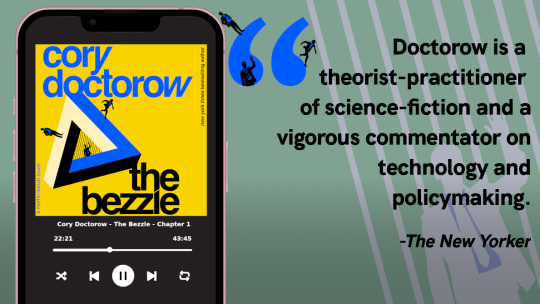
Back the Kickstarter for the audiobook of The Bezzle here!

Image: Drahtlos (modified) https://commons.wikimedia.org/wiki/File:Motherboard_Intel_386.jpg
CC BY-SA 4.0 https://creativecommons.org/licenses/by-sa/4.0/deed.en
-
cdessums (modified) https://commons.wikimedia.org/wiki/File:Monsoon_Season_Flagstaff_AZ_clouds_storm.jpg
CC BY-SA 2.0 https://creativecommons.org/licenses/by-sa/2.0/deed.en
404 notes
·
View notes
Text
Some people need to realize that targaryen does not equal to n@zis like wtf that is actually so disgusting to compare them , like is education banned in America or something because I learned it in ninth grade n@zis wanted a nation with pure blood aryan and no not blonde babies that is a misconception they prefered brunettes , they hated a certain group of people due to racism and literally sent out for people to hunt them and separate them from society it was genocide, meanwhile the targaryen were from a minority community and yes they practised incest and mind you I am very against incest in real life the culture where I am from does not even allow you to marry someone who shares a last name with you because we are a small minority and it means we have shared a ancestor and also I am not allowed to marry someone of my clan and another who is related to me because we share the same ancestor or even if my mother sister marry's another clan I still cannot marry my cousin , or someone who shares a gotra with me and within the laws of my country three generation upto to my mother side and five generation upto my father side unless tradition. Just to clarify if someone calls me an incest defender targaryen exist in a fictional world which was inspired by europe who practice incest up to some degree like uncle niece marriages where allowed for political reasons and cousin marriage was very popular, not everything is black and white you don't like incest fine fair , but understand the context and time period and their culture and these are the same people who will go on and ship aegon x haelena , jaehaera x aegon iii , jonsa like the ancient Egyptian practicesed incest are you just gonna say that their culture and practices are evil because they did incest qnd they are also not colonizers a quick search in wikipedia would show it's meaning Colonization (British English: colonisation) is a process of establishing occupation of or control over foreign territories or peoples for the purpose of cultivation, exploitation, trade and possibly settlement, setting up coloniality and often colonies. Colonization is commonly pursued and maintained by, but distinct from, imperialism, mercantilism, or colonialism, the targaryen did not force people to follow their gods or their culture they accepted westros culture and their religion many septas were produced from the dynasty
#anti team green#anti alicent hightower#team black#house of the dragon#pro team black#pro rhaenyra targaryen#rhaenyra targaryen#asoiaf#pro targaryen#house targaryen#targaryen dynasty
32 notes
·
View notes
Note
I cast summon chocolate milk
Thanks anon, I give you the title of Official EVIL Minion. RAHH. I need to do that more often it makes me happy.
1 note
·
View note
Note
i made you some coffee and eggs! they're in the kitchen for when you're ready!!! you doing okay?
Oh, thank you. You didn't need to do that. That was nice. I'm doing okay, I think staying with you last night helped me a lot.
12 notes
·
View notes
Note
Silliest/funniest thing Skittle's done recently? And Effie?
i was hanging out with skittle recently and i left to go put water on the stove to make some loose leaf tea for the both of us. i walk back in to see her playing on my fucking cat tree, she just looked at me and started turning profusely red and hid his face in his shirt. fucking adorable
and with effie i found it silly when i walked into her researching all the different types of catnip and their effects. she seems to be intrigued by how i’m effected by catnip.
#rick and morty#rp blog#colon three morty#morty smith#kitty morty#ask blog#colonthreemorty#evil morty#morty c137#p3morty
9 notes
·
View notes
Note
Please, please, please don't drink. Just... come home? 3 and I are worried. We want you here with us. You can talk to us about it all. We're willing to listen, no matter how much you need to vent out. So please, please come home.
- @emorty
i dont want you guys to deal with me right now.
#rp blog#morty smith#rick and morty#morty c137#evil morty#ask blog#colon three morty#p3morty#pemorty
8 notes
·
View notes
Text
going through posts. i want a dedicated one, to talk about this. i have no idea, where i would begin. but i think wis' racism has gone on too long, and has been given too much leeway. i typically give people much more benefit. i do not think, accidentally saying a very loaded word makes you racist. but words like "uppity" have very specific meaning to black people, especially black women. where did wis learn it, and why is she using it in reference to a person of color she had just racially harassed. truly, in what context, does wis think describing a transgender person venting their abuse, makes them "all uppity about it".
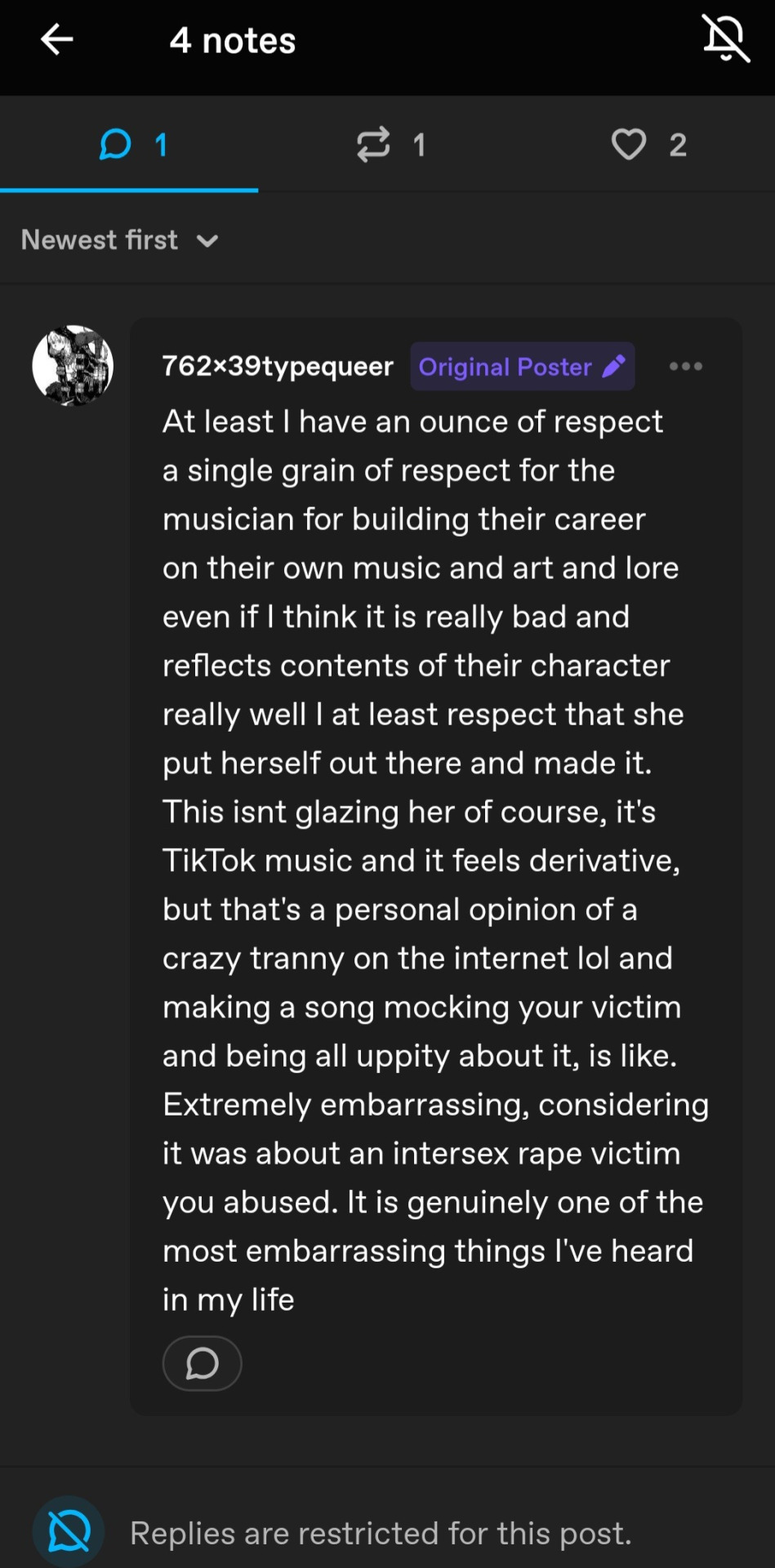
much less, the way she has "accidentally" called several latino people dogs, for "no reason".

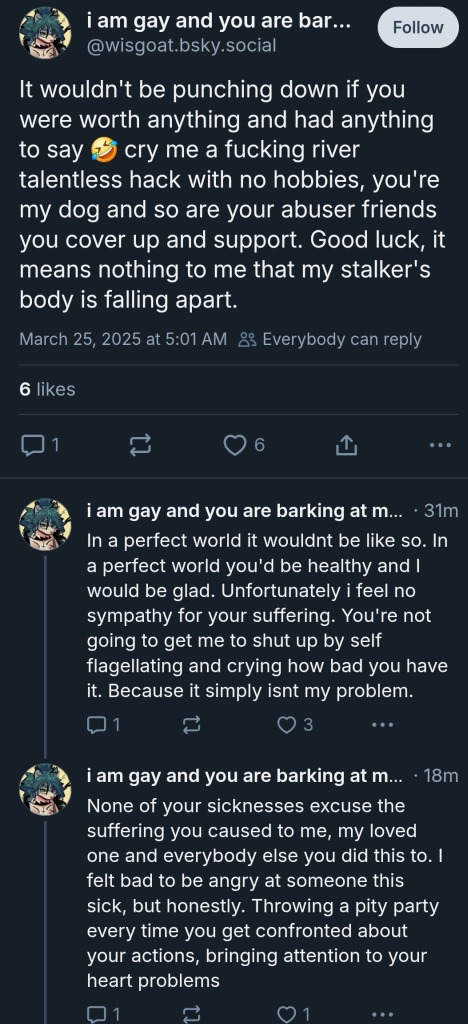
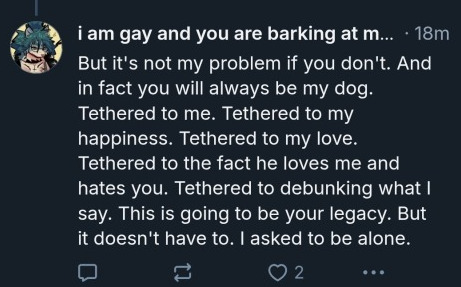
or, if we are going to just be outright, why does wis have such an affinity for stealing black terminology and speech. is it not fucking obvious, the word she is meaning to use in place of ""feller"". why is a white person talking this way, i do not care they are dating a black person.
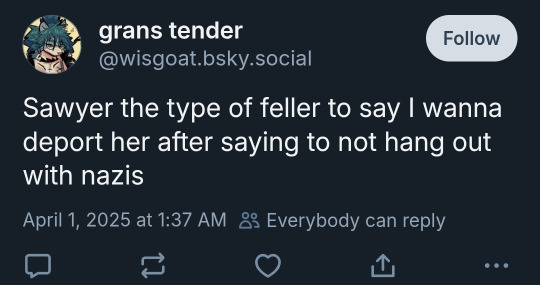
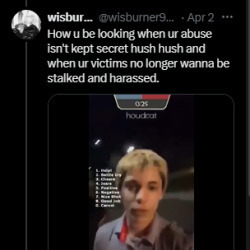
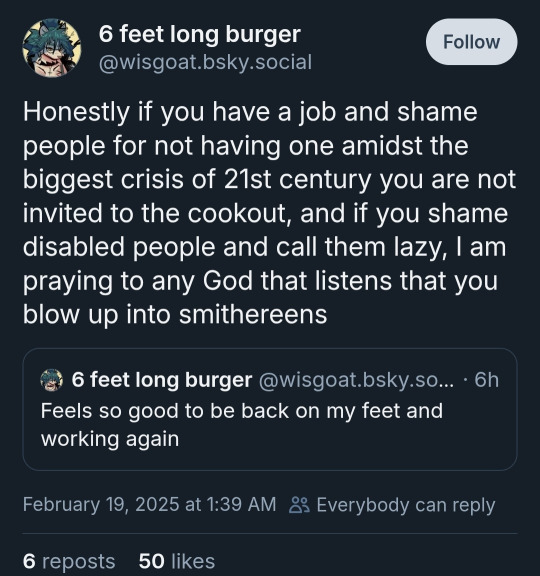
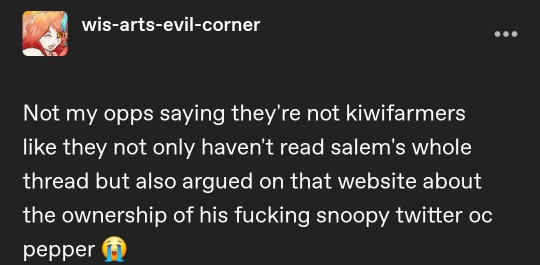
she can yap all day apparently, about how latinos are colonizers, how evil they are. but by the way, god forbid you mention she is white, because then she cries like this, and accuses you of being RACIST FOR REMINDING HER SHE IS WHITE. and of course, speaking for black people while using her black boyfriend as a shield by the end of it, to try and say "calling me a cracker, actually doesn't help your cause".


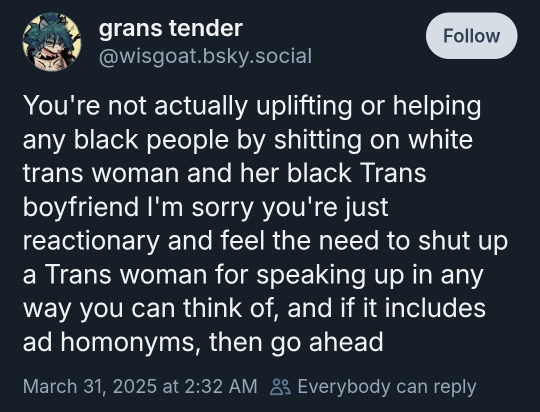
oh. and lest we forget so soon. do we truly think she has unlearned this logic, that whites have always been more oppressed than any poc, ever. directly talking down to a black person about slavery, and how white people had it worse. is she literally not just repackaging this logic, but saying "white trans women have it worse than any poc" ?

if someone is "accidentally" racist, once. i can make excuses for them, as to why they did not mean it. when you are "accidentally" racist, two, three, four, five, six times over. you are a racist.
24 notes
·
View notes
Text
Rio Theory
I, like many of you, have been acting under the assumption that Rio is a primordial being, who has been alive since the dawn of humanity with the sole purpose of ferrying souls across the veil.
But what if that's not it at all?
What if, instead, Rio Vidal is being punished. After all, why give Death a name. Yes, it could just be a name she gave herself when she interacts with mortals, like Agatha, to conceal her true identity, and I know the name is akin to "River of Life" but it feels more...formal. Like she was actually born to somebody who gave her this name.
So what if she was?
What if Rio was born a mortal and was given this job after her own death as a punishment for some kind of evil she did. Maybe the "evil" wasn't even evil at all, but something she did out of desperation to try and save herself. Maybe she, too, killed her own Coven. Or maybe she was a necromancer and took her powers too far, blurring the divide between life and death, causing chaos everywhere she want until her own fatal mistake placed her in front of the old gods, who decided her penance would be to ferry a certain number of souls so that she understands just how important that divide between life and death is, that it's not something to be trifled with.
I'm imagining, since she speaks Spanish and Aubrey is Puerto Rican, that she was born in South/Central America, after it was colonized, and her family moved to The New World when she was a child (which is how she ended up in Salem to meet Agatha) and shared their way of doing magic with the locals.
And, while Aubrey is Puerto Rican, in Mexican culture death is a pretty big deal for a lot of us. Día de los Muertos is a huge thing. It's the time when you get to see your deceased loved ones. Maybe somebody important to Rio died. Maybe her parents or a sibling or the woman that she first loved. And she was obsessed with this day where she got to see this person through the veil. Maybe she tried to find a way to make her come back, to raise her from the dead.
But it went wrong and she lost her forever.
So she moved on. She met someone new. They died. She brought them back to life, but it was wrong. They were wrong. They were just a puppet, not their true self. So she becomes obsessed with learning how to do necromancy just right, so that anybody she loves can never just die. She can't lose anybody ever.
So she kind of becomes a serial killer. Just a little bit.
But she can never quite get it right. Nobody is ever the way they used to be. Either they're in constant pain/anguish or they are just not them. And Rio ends up killing her own creations, devastated that she just couldn't bring them back to themselves.
And it weighs on her, but it's still an obsession.
Until she makes a fatal mistake and is killed in response to trying to killing somebody else. And she goes in front of the old Gods, who sentence her to reap, like, a hundred times as many souls as she's tortured in her lifetime, however unintentionally, by forcing them to take part in her experiments. As a witch, since most of her victims were of the magic ilk, she must ferry other witches and magical folk across the veil until she has fulfilled her punishment.
And since witches can live for centuries, she will not fulfill this anytime soon. And she can't kill anybody. If she manages to kill somebody, it resets her punishment back to zero. She also cannot make exceptions for those she loves, no matter what. She cannot bring somebody back to life like she'd spent her life trying to do. There are no loopholes.
And it does teach Rio the importance of Life and Death and why that should never be taken as a joke.
Still, after like two to three hundred years and she's not even halfway there? Rio is getting anxious. She wants to cross over finally. She wants to be done with this punishment. She needs more bodies but she can't make them herself.
That's where Agatha comes in.
Rio can feel the death of magical beings. She feels it when seven witches die all at once, then another witch in the same general area dies just seconds later.
It's like she hit the Jackpot of bodies. So many magical deaths in the space of a couple minutes? She needs more of these!
So she goes to where they died and is practically giddy at the bodies littering the forest floor. Skipping around the circle, freeing the souls from their bodies, practically forming a conga line to the afterlife.
Then she sees Agatha, curled up and crying nearby. At first, she thinks that this is an escaped witch, one who just watched her entire coven die before her very own eyes. She has empathy. She knows what it's like to watch the ones you love die in a violent fashion. And these bodies...they were definitely killed violently. They died painful deaths.
So she approaches Agatha, who is sobbing into her knees. She crouches in front of her and asks if she's okay, if she has anybody she can stay with, anybody else who survived.
And then Agatha looks up and she's smiling, which takes Rio aback. And then Rio notices her black fingers and it clicks.
Agatha isn't a victim; she's the murderer.
And Rio is just in awe of this witch's power. She sits down in front of Agatha and asks, "how?" Because how did she kill all of these witches all at once?
"I wasn't trying to," Agatha explains. Even though she's smiling, there are tears in her eyes. "They were trying to kill me! But something...happened. I've never experienced anything like it. They all attacked me and I just...took their magic. I took their life forces. I killed them." She laughs, somewhat manically. "Isn't that funny?"
Rio cannot help but smile at it. "Hilarious," she says. "Thank you, by the way. I appreciate the work." She motions to the line of spirits behind her, all impatiently waiting to be ferried. Agatha cannot see them, which Rio realizes too late. "It's....I'm not crazy, I swear. But, uh, who's that person?"
She points toward the husk just in front of the stake, where an angry, vengeful witch is refusing to move from above her body.
Agatha laughs, rolling her eyes. "That," she says, "is my mother. She orchestrated all of this."
"Your mother tried to have you killed?" Rio huffs. "What a bitch."
Agatha lets out a cackle at that. "You have no idea," she says, her chin quivering a bit, betraying the hurt she tries not to let show. "I have no idea what I'm going to do now."
"You don't have anybody?" Rio asks, something in her chest aching. It's something she hasn't felt in a long time, since her heart went black.
Agatha motions toward the circle of bodies. "Who would take me now?" she asks. "After what I've done?! I'll be lucky if there aren't already mobs of people waiting for me with torches and pitchforks. I have nobody, nothing." Now is when she lets her facade fall. "I am alone."
"No," Rio says, reaching out to take her hand, "you're not. You never will be again." She intertwines their fingers and feels a spark in her she thought was long dead. She knows that Agatha feels it, too, because she squeezes Rio's fingers.
"Who are you?" Agatha asks.
"My formal title," Rio says, standing up and pulling Agatha with her, hands still clasped, "is Lady Death. I ferry the souls from the mortal realm to the afterlife." She looks back at the spirits that Agatha cannot see. "I actually have a lot of work that I have to do. Thank you so much for that, by the way." She grins at Agatha. "Genuinely," she adds, when Agatha looks a little sad. "This is a huge help. You have no idea."
"You're welcome?" Agatha replies, chuckling awkwardly. They're still holding hands. "But surely you must have a different name I could call you."
"Rio," Rio says. "Rio Vidal."
"A little on the nose," Agatha retorts. "Don't you think?"
"My mother had a sense of humor," Rio says. "And you?"
"My mother was not a funny person," Agatha sighs, "at all."
Rio snorts at that, looking over to where Agatha's mother was practically spitting mad: "And she took my brooch! That was my mother's brooch!"
"Yeah, I can tell," Rio says. "But what I meant was," she looks back at Agatha, "what is your name?"
"Agatha Harkness," Agatha says.
"Ooh, a Harkness," Rio says. "Powerful magic. And based on that purple between your fingers, you must be following in the same tradition of powerful witches. Spirit witch?"
Agatha nods. "I was born under the Blood Moon, which endowed me with certain...powers, apparently." She laughs, bitterly. "Just don't try to blast me with your magic and I won't hurt you."
"You couldn't hurt me," Rio says, "even if you tried. If you took my magic, you'd die. And you are far too valuable to kill. Not that I could, anyway." She shrugs at Agatha's raised eyebrow. "Rules of the trade."
"Well, then," Agatha says, flushing a beautiful pink, "it's a deal: I won't kill you and you won't kill me."
"Fair trade-off."
"I would think so."
They're silent for a long moment, energy crackling between them. Two powerful beings who finally found their match.
It's the start of a beautiful, murderous love story.
By the time they separate, Agatha has made a sizable dent in Rio's debt. Rio pays her back by showing her spells that otherwise probably wouldn't have been available to her. Agatha is so brilliant and studious and passionate, Rio would do anything for her.
Except the one thing she absolutely cannot do when their son dies.
And she finally understands what the Gods meant when they said that life and death are not to be played with, that there is always a cost.
Nicky was that cost for her. Agatha was that cost.
Agatha continued to give her bodies, but Rio never knew about them until Agatha had left the scene of the crime. She never had a chance to meet her again after Agatha started hiding behind the Darkhold. There was no way of getting around it.
Which is why she immediately rushed to her side when Agatha lost it, along with her power. There was no way she was letting her get away again.
84 notes
·
View notes
Text
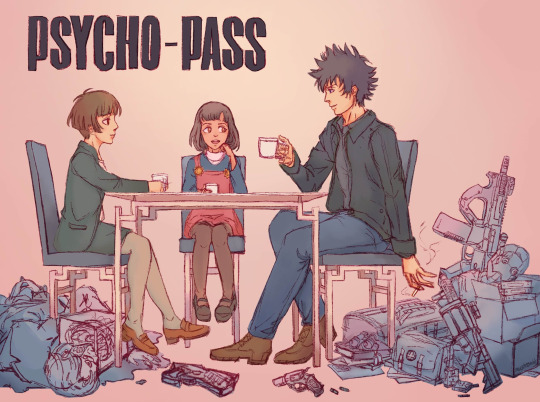
Shinkane Week 2024:
DAY THREE: Time or Space
Spy x Family AU
Kogami works for MoFA agents, Akane is a secret inspector under Sybil, and Tenzing is a teenager that can read minds.
(more notes under on this AU that is now living in my brain rent free)
(post pp3 vibe)
Kogami is the one who is told by Frederica to adopt a teenager to send to a school (?) something something Sybil's elites. He finds Tenzing, a very bright and perceptive kid who decides to follow Kogami around and ask him to teach her how to avenge her parents. Because he looks very tough, and because she can read minds, but she doesn't tell him that.
Akane does spying and investigating work in the dark for Sybil, even though she knows the truth of about Sybil, she sees it as a lesser of evils for now. Sybil "suggests" her to marry Homura. (ah yes, the funny colon three cat Homura is also here, and also hmm the ao3 fanfics you know I have been reading) To escape this arranged political marriage, Akane is set to find herself a husband to get out of being more of a pawn of Sybil.
Kogami runs into her and somehow Akane propose to him. (Kogami is too much of a wet cat to be able to ask her.)
Tenzing is often told she looks like Akane, that they have same eyes. Even through in this cover story Tenzing is supposed to be Kogami and his ex wife's child, everyone keep thinking Tenzing and Akane are blood related.
Akane cannot cook at all, Kogami is the one who cook for the house.
I need to draw Mika as Yuri coming to visit their apartment, god it would be so funny.
I wrote way too many words in @h4msanta's DM about how everyone fits into this AU. I might just have to keep drawing more art so I can explain it.
Notes on the drawing:
(This was such a blast to draw! I am so happy with this piece. This is a parody of Spy x Family Mission 1 cover.
Most of the hard work was to find things to populate the ground with. On Akane's side we have some exploded bodies, a dead Kasei and a funny brain in vat. Kogami's side is what I was really spend a lot of time thinking. I spent a lot of time looking at blurry images of profiling books and also screen shots of different parts of the show. I have now become friends with imfdb. We have his trusty revolver; dog tags and med bag from 2015 movie; huge backpack from sinner of the system 3; Milkor Mark 14 that goes "thonk" that Kogami has with him in the 2015 movie when he runs into Akane; the practice drone that Kogami beats up in s1, Hera Arms CQR that Kogami uses in the beginning of Sinner of the system 3. I even googled lengths of guns so I can fit everything in.)
#psycho pass#shinkane#shinya kogami#shinya kougami#akane tsunemori#kogami shinya#kougami shinya#tsunemori akane#psycho pass providence#psycho pass first inspector#Shinkane Week#i am so normal about them#shinkaneweek#spy x family au#psycho pass sinners of the system#Tenzing Wangchuck#tenzinggg i love her so much#she is so previous#Psycho-pass
56 notes
·
View notes